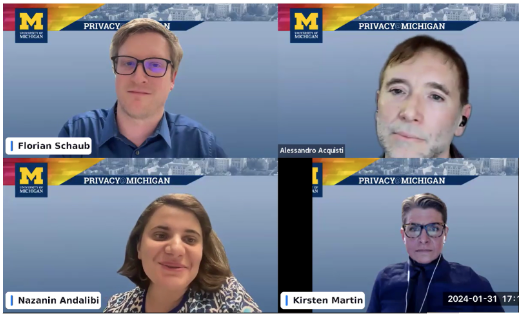
“Recently a new territory has been discovered by economists, the intellectual continent we call ‘privacy.’ The pioneers are our peerless leaders Posner and Stigler… but I will be contending that the mainland of “privacy” is not the idea of secrecy as our pioneers appear to believe — secrecy is only an outlying peninsula.”
– Jack Hirshleifer
The annual celebration of Data Privacy Day at the University of Michigan kicked off with a Privacy@Michigan keynote event featuring Prof. Alessandro Acquisti, Trustees Professor of Information Technology and Public Policy at Carnegie Mellon University’s Heinz College, and the co-director of the CMU Center for Behavioral Decision Research (CBDR).
In her welcoming remarks, Prof. Andrea Forte, professor of information, dean of the University of Michigan School of Information, and a privacy scholar herself, shared her belief that privacy is a “grand socio-technical challenge and fundamental to the human experience” and expressed appreciation for the multidisciplinary and collaborative nature of the Privacy@Michigan event series.
Prof. Acquisti led the audience on an “hourglass” journey including a broad introduction to the economics of privacy, research findings from his soon-to-be-published study, and a forward-looking perspective on the field. Acquisti described his latest work as a “love letter to my own field” — a discussion of the successes and shortcomings in economic theory and research in the context of privacy. He juxtaposed economists’ perspective on privacy as concealment of information that creates economic inefficiencies in the marketplace, to that of privacy scholars who view privacy as boundary regulation fundamental to human rights. Acquisti shared that economists’ limited interpretation of privacy and narrow research focus on the cost of privacy has made him wonder whether “my whole field is missing the forest for the tree.”
According to Acquisti, economics does not discuss enough the cost of privacy invasion and he is looking to reframe the debate. His latest study challenges the widely accepted assumption that more data results in more value by looking at consumer benefit from targeted ads — spoiler alert: he finds no empirical validation of the claim. In his final remarks, Acquisti recognized that while the field of economics of privacy has grown tremendously since the 1980s, it needs to focus not only on the benefits of data, but also understand who the beneficiary is. He believes that “there is hope that we as economists can capture something richer, more profound than just privacy as concealment.”
The thought-provoking presentation was followed by a panel discussion moderated by Prof. Florian Schaub, associate professor of information and associate professor of electrical engineering and computer science at the University of Michigan. Prof. Nazanin Andalibi, assistant professor at the University of Michigan School of Information, shared her thoughts in the context of her work on how people regulate their privacy boundaries online. Prof. Kirsten Martin, William P. and Hazel B. White Center Director, professor of technology ethics, professor of IT, analytics, and operations at the Mendoza College of Business at the University of Notre Dame, offered her perspective on corporate responsibility when it comes to privacy protection. Martin recognized the extent to which economics’ limited interpretation of privacy has impacted the way industry argues about privacy and has “infected” public policy around privacy. “Alessandro’s work is so incredibly important within economics because a lot of the work within business schools is based on theories of economics; and so it impacts the way that people in business schools frame privacy and teach it.”
Watch the recording of the event on the Safe Computing website and find more information and resources on privacy in the Protect Privacy section. The next Privacy@Michigan event is coming up on March 6 at 5:30 p.m. – a free screening of the 1984 film adaptation of George Orwell’s 1984 at the Michigan Theater. To stay informed of Privacy@Michigan events, join our Safe Computing Events mailing list.
